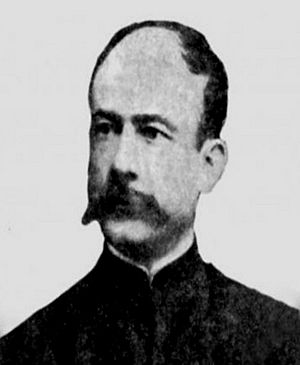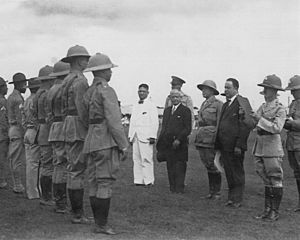José María Moncada facts for kids
Quick facts for kids
Jose Maria Moncada Tapia
|
|
|---|---|

José María Moncada in 1910
|
|
| President of Nicaragua | |
| In office 1 January 1929 – 1 January 1933 |
|
| Vice President | Enoc Aguado Farfán |
| Preceded by | Adolfo Díaz |
| Succeeded by | Juan Bautista Sacasa |
| Personal details | |
| Born | 8 December 1870 San Rafael del Sur, Nicaragua |
| Died | 23 February 1945 (aged 74) Managua, Nicaragua |
| Political party | Liberal Party
José Nemecio Moncada Castañeda (father) Zoila Eva Mayrhauser Tapia (mother) |
José María Moncada Tapia (born December 8, 1870 – died February 23, 1945) was a very important leader in Nicaragua. He served as the President of Nicaragua from January 1, 1929, to January 1, 1933.
Contents
Early Life and Political Start
José María Moncada was born into a wealthy family in Nicaragua. He first became known as a journalist. He wrote for a newspaper that supported the Conservative Party. Later, he even published a newspaper that supported the government of President José Santos Zelaya.
However, by 1906, Moncada disagreed with President Zelaya. He left Nicaragua and went to Honduras. There, he worked in the government. When a revolt started against Zelaya, Moncada joined the Conservative side. After Zelaya was removed from power in 1910, Moncada worked in the new Conservative government.
Switching Parties and New Challenges
Even though he started with the Conservatives, Moncada later joined the Liberal Party. He continued to oppose the Conservative Party's control of Nicaragua. In 1925, his strong opposition forced him to leave the country again. He went to Costa Rica. From there, he worked to gain support for the Liberal Party to return to power.
The Nicaraguan Civil War (1926–1927)
After Adolfo Díaz was re-elected as president in 1926, a general named Emiliano Chamorro tried to take over the government. This happened after American soldiers, called Marines, had left Nicaragua. Chamorro's attempt did not get support from the United States.
Liberal Forces Rebel
Because of this, Liberal forces started a rebellion. They wanted to overthrow President Díaz's government. José María Moncada was one of the main leaders of this rebellion. Other leaders included Juan Bautista Sacasa and Augusto César Sandino. The United States supported Díaz's government and sent military help.
Peace Agreement and Continued Fight
The Liberal forces were close to taking over the capital city, Managua. But the U.S. stepped in. They made both sides agree to a peace plan called the Espino Negro accord. Moncada and Sacasa agreed to this peace. However, Augusto Sandino refused. He continued to fight. Sandino led a guerrilla war against the U.S. Marines.
Moncada Becomes President
In 1928, elections were held in Nicaragua. These elections were watched over by the U.S. Marines. After the elections, José María Moncada replaced Adolfo Díaz as president.
Moncada's Presidency (1929–1933)
Moncada's victory as president surprised many people. His opponent, Adolfo Díaz, was a close friend of the U.S. government. Moncada's win was helped by a deal made by Henry Stimson, a special representative from the U.S. This deal aimed to end the civil war quickly.
Challenges During Presidency
Even after Moncada became president, U.S. Marines stayed in Nicaragua. This was because Sandino and his forces continued to fight. To help keep peace, the United States created the Nicaraguan National Guard. They gave the Guard weapons and training. The Guard also helped fight against Sandino's rebels.
Moncada often asked the U.S. for help to make the country stable. The Wall Street Crash of 1929 made the U.S. government want to remove its troops from Nicaragua. Despite this, Moncada successfully asked the U.S. to watch over Nicaragua's elections in 1930. He also got enough money in 1932 to help ensure that Juan Bautista Sacasa, another Liberal politician, would win the 1932 election.
After his presidency, Moncada continued to be involved in politics. He was the president of the upper house of the National Congress of Nicaragua from 1942 to 1943.
Family Life
José María Moncada had children from two marriages.
His first marriage was to Margarita Carranza. Their children were Elsa, Aquiles, Elio, Hernaldo, Lesbia, and Alba Moncada Carranza.
His second marriage was to Josefa Reyes Gadea. Their children were Leda Maria, Omar, and Óscar Moncada Reyes. Óscar Moncada later became the President of the National Assembly of Nicaragua from 1999 to 2001.
Written Works
José María Moncada also wrote several books and papers. Some of his works include:
- The social world (1912)
- Justice!: An appeal to the Executive Power and the Senate of the United States (1913)
- Imperialism and the Monroe doctrine (their influence in Central America) (1911)
- Social and political influence of the United States in Central America (1911)
| Political offices | ||
|---|---|---|
| Preceded by Adolfo Díaz |
President of Nicaragua 1929–1933 |
Succeeded by Juan Bautista Sacasa |
See also
 In Spanish: José María Moncada para niños
In Spanish: José María Moncada para niños
 | James Van Der Zee |
 | Alma Thomas |
 | Ellis Wilson |
 | Margaret Taylor-Burroughs |


